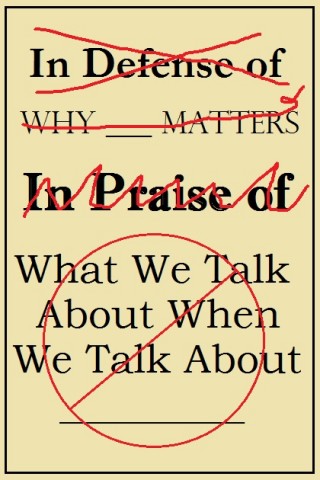June 1, 2015
Boring headlines on the internet are bad. Unlike boring book titles, which are good.
by Mark Krotov
 There are only so many ways to title an article, an essay, or a blog post, and most of those ways are very boring. Indeed, in 2015, titles are more boring than ever, thanks largely to the influence of what The Awl’s John Herrman calls “the content wars.” Everyone is angling for clicks, and puns, allusions, and evasions don’t make for healthy clicking.
There are only so many ways to title an article, an essay, or a blog post, and most of those ways are very boring. Indeed, in 2015, titles are more boring than ever, thanks largely to the influence of what The Awl’s John Herrman calls “the content wars.” Everyone is angling for clicks, and puns, allusions, and evasions don’t make for healthy clicking.
Here, for example, are a few of the titles one can read on the front page of The New Republic’s website, as of 1:26pm on Sunday, May 31:
- Don’t Search for “Purpose.” You Will Fail.
- California Has No Idea How Much Water It Has Left. NASA Can Help.
- Prosecuting FIFA Underlings Is Worth It, Even If Sepp Blatter Gets Away
- One Photographer Documents Sweden’s Amazing Leave Policies
- Martin O’Malley Shouldn’t Be Mad at Bernie Sanders—and Shouldn’t Attack Clinton, Either
What dull, dreary titles! I hope that the editors at Harper’s, who frequently come up with gems like “Bot for Teacher,” “Unread at Any Speed,” and “Genre Friction” (all of these from the last two months’ of the Readings section), never encounter the straightforwardness on display here. Those poor, impressionable spirits may never pun again!
Which is not to say that I’m unsympathetic to the New Republic’s headline writers. After all, these brave souls are doing battle in difficult times. The pieces in TNR are usually far more interesting than their headlines suggest, which is true of many of the publications that resort to this blunt, literal style. So if someone in search of some unambiguous, straightforward #content clicks through to something unusual and provocative, the forces of good will have won out.
And it’s not just the New Republic, of course. Almost everyone online is getting into the game (see the title of this post), and I, for one, look forward to the near future, when the London Review of Books switches to all-emoji titles. I can see it now:
Thankfully, books have not fallen victim to the content wars—at least when it comes to titles. You can give an online excerpt of a book the most inane headline ever, and the original title will not suffer. Go ahead and excerpt Owen Jones’s The Establishment: And How They Get Away With It, which we published in April, and call the excerpt “Neoliberalism Is Evil. And It Has Taken Over the United Kingdom. And Here’s What We Should Do About It.” That’s an awful collection of words, but it will not detract from the awesomeness of The Establishment: And How They Get Away With It, which is an amazing title and book.
This is not to say that all books get to have great, original titles, like Rules for Werewolves (which we’re publishing in October), Not on Fire, but Burning (which we’re publishing in September), and Golden Delicious (which we’re publishing next year). Not all books, after all, can be published by Melville House.
But I’d argue that even boring book titles have their virtues. Unlike boring internet headlines, which seem to be getting longer and longer even as they become more rigidly formulaic, boring book titles tend to stick to the same, concise formula, and they are most fascinating for their variations, which are endlessly revealing.
Take the “In Defense of” template. Tomorrow, Palgrave Macmillan will publish a book called In Defense of Selfishness: Why the Code of Self-Sacrifice is Unjust and Destructive. The author, Peter Schwartz, is a distinguished fellow at the Ayn Rand Institute and his book, which no one should read, is as pedantic and pretentious as you would expect from its title.
But that title is great! Who knew that selfishness was something that needed defending in 2015, a moment in history when leading Republican presidential candidates fall over themselves to try to sound more callous than a drunk finance bro striking out in Murray Hill. The best thing about this title, though, is that it lets us examine what other things need to be defended. Here’s a partial list from the last few years:
This is the great thing about boring book titles—comparative analysis. A quick look at a database shows us that flogging, reading aloud, and selfishness are all things worthy of our collective defense.
Let’s try another one:
- In Praise of the Pomegranate
- In Praise of Doubt
- In Praise of Intransigence [the subtitle is The Perils of Flexibility, which is just perfect]
- In Praise of Copying
- In Praise of Messy Lives
So if you’re an author who has come up with a boring title, or an editor arguing with your author about a boring title, or the significant other of an author begging him/her not to go with that boring title because Jesus Christ, there are literally thousands of books with similar titles, don’t fret! Unlike boring internet headlines, which will slowly transform our brains into cauldrons of the literal, boring book titles allow us to better understand our shared concerns, traumas, and obsessions. They show us that intransigent pomegranates are worthy of praise, and that things and nothingness should be defended.
Indeed, I thought about calling this post “In Defense and Praise of Boring Book Titles.” But I needed the clicks.
Mark Krotov is senior editor at Melville House.
